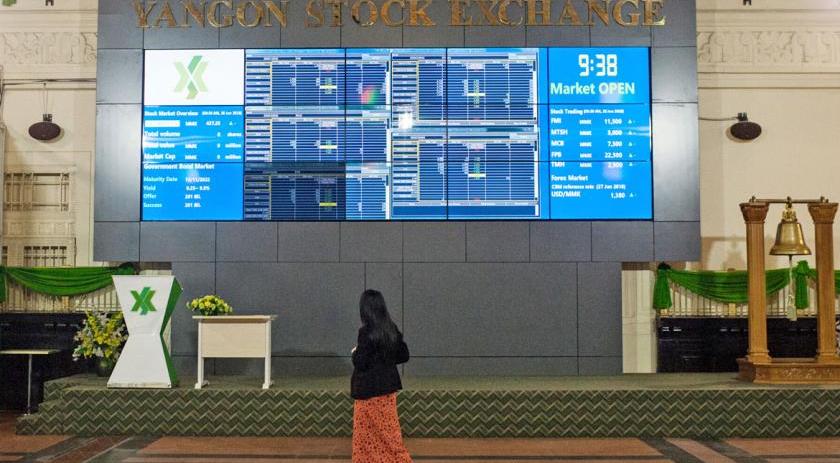
Just a little over three years old, the Yangon Stock Exchange (YSX) faces low daily trading volume and a lack of companies willing to go public.
Meanwhile, firms that are considering going public are sitting on the sidelines while evaluating the situation.
As a result, Myanmar’s stock market is still quiet, experts and business people say, adding that a more vibrant capital market would be good for the country’s economic growth.
To accelerate growth, the stock market need to have depth and breadth, economists said. With a strong capital market, companies could boost manufacturing and exports.
Now that the YSX has been established, the sluggish conditions of the market need to be addressed.
There were only three listed firms on the YSX in 2016, when it transacted 2.55 million shares worth K70.74 billion and 70,000 block trades worth K2.25 billion.
In 2017, the number of listed firms rose to four, 2.71 million shares worth K22.13 billion changed hands, and there were 1.6 million block trades worth K 7.22 billion.
Last year, the number of listed firms rose to five, but volume retreated slightly to 2.36 million shares worth K11.5 billion and 680,000 block trades worth K2.51 billion.
“At present, there is little activity on the stock exchange and confidence is lacking. Interest in the market should be created. Both the government and YSX need to emphasise it,” said U Aung Thura, CEO of capital market consultancy Thura Swiss Ltd.
The decline in share trading and value is not a positive sign, said former deputy minister of finance U Maung Maung Thein.
“The market has been relatively quiet. In addition to slack trading, prices have fallen. This is not a positive sign. If the market remains like this, we need to do something that can re-enrgise it,” said U Maung Maung Thein, adding that this is causing companies to take a wait-and-see attitude toward listing.
Myanmar Agribusiness Public Corp Ltd (MAPCO) announced that it will go public only after 2020.
“We have some plans to reform our company. We need to wait for a situation that can encourage development of the country’s capital market. The country will hold elections in 2020, so local and foreign investors are not likely to make major investment decisions before then. We need to wait and see,” said MAPCO Managing Director U Ye Min Aung.
He said that despite the delay, MAPCO is working toward becoming a listed company.
“One thing for sure is that the restructuring and reorganisation of MAPCO will be completed in the first half of this year, and we will be preparing to list on the YSX,” he added.
Infrastructure builder Great Horkan Co has been considering listing on the YSX since last September, “but there some things that need to be taken care of first,” said its chair, U Sai Ohn Myint.
Among the things being monitored by companies seeking a listing is the ability of foreign investors to trade on the YSX.
The regulations to enable foreigners to buy and sell shares on the local stock market may be out by March, said Securities and Exchange Commission of Myanmar member U Htay Chun.
“The regulations to enable foreigners to participate in the local stock market are in the last stage and have been submitted to the Ministry of Planning and Finance. The market is still inactive, so we need to shake things up, but it will not be developed instantly,” U Htay Chun said.
Although foreigners will eventually be allowed to purchase shares on the local market, more stockbroking companies are needed to develop the market, said U Aung Thura.
“It doesn’t work only with the permission for foreigners to buy shares. Currently, we have a few stockbroking companies for investors to choose from. On the other hand, as there are few investors, few firms are eager to become stockbrokers as they see little profit in it,” he said.
“Foreign investors are watching the local market, but in the eyes of the international community there are problems in the country. Although investors want to come here, they are still watching and waiting,” said U Maung Maung Thein.
At the start of the year, the Ministry of Planning and Finance announced that foreign companies would be allowed to enter the insurance market. This offers potential for the development of the stock market and capital market, U Aung Thura said. “It is good to allow foreign insurers into the local market. If the insurance market develops, insurance companies usually invest in the stock market, so they are good for the future capital market,” he said.
However, the government needs to find more ways to increase the number of listed companies, he said, adding that many local companies are unlikely to enter the stock market as they have weaknesses in transparency and business discipline,.
“Many local companies are weak in corporate governance and compliance. More investment will come into the country if these weaknesses can be overcome, which would move them closer to being able to raise capital in a listing,” said U Aung Thura.












